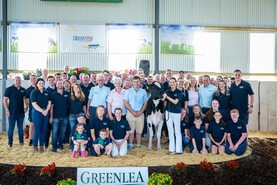The Department of Agriculture removed almost all cattle and sheep from a Co Clare farm as it had a mortality rate of two to three bovines dying per week due to a farmer’s neglect, a court has heard.
At Ennis District Court on Friday, Department of Agriculture veterinary inspector Andrew O’Connor outlined the level of animal neglect at the farm of Pat Cahir (61) of Buncraggy, Ennis, which he visited 22 times between November 2023 and October 2024.
Mr Cahir’s farm had 100 cattle and 200 sheep and recalling the conditions he came across on his first visit to the farm in November 2023, Mr O’Connor said that the “cattle had no fodder. They were hungry. They were lean, in poor body condition and scavenging for anything they could get. There was no grass.”
He said that the sheds were not in a fit state to inhabit and there were water troughs which were highly contaminated with algae growth and stagnant water.
Mr O’Connor said that the mortality rate was too high, where you had two to three bovines dying per week.
He said that the Department decided around Christmas 2023 to remove the animals and on 4 January 2024, the Department “seized all animals bar 10 bullocks and a handful of sheep that were uncatchable on the day”.
Levels of neglect
A booklet of photos of the neglect was handed into court showing the level of neglect, including abandoned carcases of animals on the farm.
After viewing the photos, Judge Alec Gabbett admitted that he was "stunned" by what he had seen.
He said that there was evidence that some of the animal carcases he had seen were there for weeks.
“These are the most distressing set of photos of animals I have seen in a long time. It takes a hard stomach to walk past what I have seen,” he said.
On behalf of the Department of Agriculture, Thomas Wallace O’Donnell BL, instructed by State Solicitor for Clare, Aisling Casey, said that Mr Cahir had agreed to a compliance notice which limits his stock to 20 bovines and no sheep.
In response, Judge Gabbett asked: “What about the 20 bovines - do they have no rights?”
Judge Gabbett asked: "Is there capacity to comply with the notice - it strikes me that someone’s capacity is at issue today. They are not able to do it or can’t do it."
Solicitor for Mr Cahir, Daragh Hassett told the court that “those photos are very admittedly quite distressing, to see the animals suffering in that way”.

Mr Cahir’s farm had 100 cattle and 200 sheep, the court heard.
Mr Hassett said that his client is a 61-year-old bachelor farmer and has farmed for almost 50 years.
Health
Mr Hassett told the court that Mr Cahir had suffered very badly with his physical and mental health, particularly since 2021 and had gone to his GP and she set out his difficulties in a letter into court.
Mr Hassett said that farming “can be a very lonely profession at times”.
He said that Mr Cahir “is now maintaining his physical and mental health, which is benefiting the animals he has going forward”.
Mr Hassett said that he was shown a video of animals grazing the lands which occurred the day before court.
He added that Mr Cahir was in dispute with his contractor over the cutting of silage in 2023, which didn’t help the situation.
He told the judge: “I am not going to justify in any shape or form the photos you have seen.”
His counsel also pointed out that Mr Cahir had no off-farm income and his annual turnover would be, at most, €30,000 per year and said that his client has a 210-acre holding and it is of mixed quality.
Mr Hassett said that general secretary of the ICSA, Hugh Farrell had been of great assistance to his client. Mr Hassett said: “He knows how serious the case is and is assisting Mr Cahir at all stages.”
Mr Hassett added that Mr Cahir lost €25,000 because of the Department of Agriculture removing the animals at that particular time.
“They felt that they had to act and Mr Cahir might feel differently as he was at the time selling cattle through the marts to reduce his numbers," he said.
Mr Hassett added that it is Mr Cahir’s wish is to return to stock levels of 50 cattle and 50 sheep. Mr Hassett said that Mr Cahir feels that a 20 cattle limit “is going to eventually bankrupt him”.
Guilty plea
In the case, Mr Cahir has pleaded guilty to neglect or was reckless regarding the health and welfare of animals, namely sheep and cattle between 17 November 2023 and 23 May 2024 under Section 1(b) of the Animal Health and Welfare Act.
Mr Cahir also pleaded guilty to regulations concerning the disposal of carcases where he had carcases of animals, namely cattle and sheep on land which a dog may have had access to.
Judge Gabbett said it was an appropriate case for monitoring and adjourned the case to 10 October.
The Department of Agriculture removed almost all cattle and sheep from a Co Clare farm as it had a mortality rate of two to three bovines dying per week due to a farmer’s neglect, a court has heard.
At Ennis District Court on Friday, Department of Agriculture veterinary inspector Andrew O’Connor outlined the level of animal neglect at the farm of Pat Cahir (61) of Buncraggy, Ennis, which he visited 22 times between November 2023 and October 2024.
Mr Cahir’s farm had 100 cattle and 200 sheep and recalling the conditions he came across on his first visit to the farm in November 2023, Mr O’Connor said that the “cattle had no fodder. They were hungry. They were lean, in poor body condition and scavenging for anything they could get. There was no grass.”
He said that the sheds were not in a fit state to inhabit and there were water troughs which were highly contaminated with algae growth and stagnant water.
Mr O’Connor said that the mortality rate was too high, where you had two to three bovines dying per week.
He said that the Department decided around Christmas 2023 to remove the animals and on 4 January 2024, the Department “seized all animals bar 10 bullocks and a handful of sheep that were uncatchable on the day”.
Levels of neglect
A booklet of photos of the neglect was handed into court showing the level of neglect, including abandoned carcases of animals on the farm.
After viewing the photos, Judge Alec Gabbett admitted that he was "stunned" by what he had seen.
He said that there was evidence that some of the animal carcases he had seen were there for weeks.
“These are the most distressing set of photos of animals I have seen in a long time. It takes a hard stomach to walk past what I have seen,” he said.
On behalf of the Department of Agriculture, Thomas Wallace O’Donnell BL, instructed by State Solicitor for Clare, Aisling Casey, said that Mr Cahir had agreed to a compliance notice which limits his stock to 20 bovines and no sheep.
In response, Judge Gabbett asked: “What about the 20 bovines - do they have no rights?”
Judge Gabbett asked: "Is there capacity to comply with the notice - it strikes me that someone’s capacity is at issue today. They are not able to do it or can’t do it."
Solicitor for Mr Cahir, Daragh Hassett told the court that “those photos are very admittedly quite distressing, to see the animals suffering in that way”.

Mr Cahir’s farm had 100 cattle and 200 sheep, the court heard.
Mr Hassett said that his client is a 61-year-old bachelor farmer and has farmed for almost 50 years.
Health
Mr Hassett told the court that Mr Cahir had suffered very badly with his physical and mental health, particularly since 2021 and had gone to his GP and she set out his difficulties in a letter into court.
Mr Hassett said that farming “can be a very lonely profession at times”.
He said that Mr Cahir “is now maintaining his physical and mental health, which is benefiting the animals he has going forward”.
Mr Hassett said that he was shown a video of animals grazing the lands which occurred the day before court.
He added that Mr Cahir was in dispute with his contractor over the cutting of silage in 2023, which didn’t help the situation.
He told the judge: “I am not going to justify in any shape or form the photos you have seen.”
His counsel also pointed out that Mr Cahir had no off-farm income and his annual turnover would be, at most, €30,000 per year and said that his client has a 210-acre holding and it is of mixed quality.
Mr Hassett said that general secretary of the ICSA, Hugh Farrell had been of great assistance to his client. Mr Hassett said: “He knows how serious the case is and is assisting Mr Cahir at all stages.”
Mr Hassett added that Mr Cahir lost €25,000 because of the Department of Agriculture removing the animals at that particular time.
“They felt that they had to act and Mr Cahir might feel differently as he was at the time selling cattle through the marts to reduce his numbers," he said.
Mr Hassett added that it is Mr Cahir’s wish is to return to stock levels of 50 cattle and 50 sheep. Mr Hassett said that Mr Cahir feels that a 20 cattle limit “is going to eventually bankrupt him”.
Guilty plea
In the case, Mr Cahir has pleaded guilty to neglect or was reckless regarding the health and welfare of animals, namely sheep and cattle between 17 November 2023 and 23 May 2024 under Section 1(b) of the Animal Health and Welfare Act.
Mr Cahir also pleaded guilty to regulations concerning the disposal of carcases where he had carcases of animals, namely cattle and sheep on land which a dog may have had access to.
Judge Gabbett said it was an appropriate case for monitoring and adjourned the case to 10 October.







 This is a subscriber-only article
This is a subscriber-only article










SHARING OPTIONS: